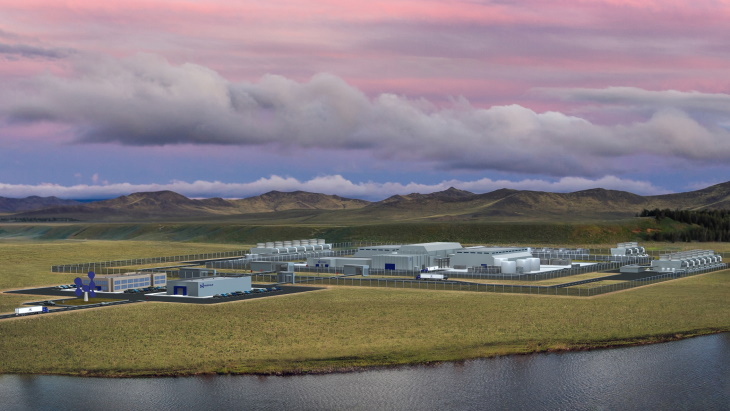Utah Associated Municipal Power Systems (UAMPS) now expects to build six 77 MWe NuScale Power Modules on a site at Idaho National Laboratory (INL), rather than 12 units as previously planned. A 2030 start-up date for the plant - known as the Carbon Free Power Project (CFPP) - is still envisaged.

How a NuScale SMR plant could look (Image: NuScale)
The CFPP, launched by UAMPS in 2015, was initially envisaged as a 12-unit power plant using 50 MWe NuScale Power Modules. The capacity of the NuScale module - a pressurised water reactor with all the components for steam generation and heat exchange incorporated into a single unit - has since been uprated, firstly to a 60 MWe version and then, in November last year, to 77 MWe per module. UAMPS said it would evaluate options for power plant size - the so-called 4-pack, 6-pack, 8-pack or 12-pack module configurations - to ensure the best overall way to meet the needs of its members.
According to a report by the American Nuclear Society (ANS), UAMPS' participants have now decided that the plant will contain six 77-MWe modules giving an overall capacity of 462 MWe. This is about 64% less than the 720 MWe that could have been generated from 12 of the 60-MWe modules.
UAMPS plans to submit a combined licence application to the US Nuclear Regulatory Commission in 2024, and the change to six modules is not expected to delay the overall schedule, UAMPS spokesperson LaVarr Webb told ANS publication Nuclear News. "The project is in great shape and is on schedule … The first module is still scheduled to be operational in 2029, and the full plant in 2030," Webb said.
The number of participants in CFPP has also reduced from the original 33. "There are 28 project participants, with a number of outside utilities expected to join the project over the next several months to reach full subscription," Webb said.
UAMPS is a political subdivision of the State of Utah that provides wholesale electric-energy, transmission, and other energy services to community-owned power systems throughout the Intermountain West region of the USA. Its members are located California, Idaho, Nevada, New Mexico and Wyoming as well as in Utah. Energy from the CFPP will replace electricity from coal plants that are nearing the end of their life cycles. UAMPS has previously said the CFPP will enable its members to add significantly higher amounts of intermittent renewable energy, especially wind and solar, to energy portfolios, allowing many to completely decarbonise.
Researched and written by World Nuclear News